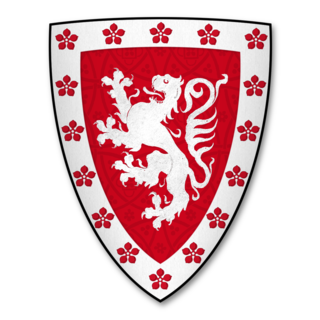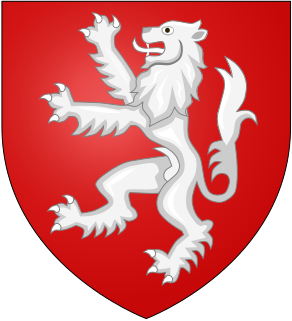Related Research Articles

Patrick de Dunbar, 9th Earl of March, was a prominent Scottish magnate during the reigns of Robert the Bruce and David II.

The Royal Burgh of Haddington is a town in East Lothian, Scotland. It is the main administrative, cultural and geographical centre for East Lothian, which as a result of late-nineteenth century Scottish local government reforms took the form of the county of Haddingtonshire for the period from 1889 to 1921. It lies about 17 miles (27 km) east of Edinburgh. The name Haddington is Anglo-Saxon, dating from the sixth or seventh century AD when the area was incorporated into the kingdom of Bernicia. The town, like the rest of the Lothian region, was ceded by King Edgar of England and became part of Scotland in the tenth century. Haddington received burghal status, one of the earliest to do so, during the reign of David I (1124–1153), giving it trading rights which encouraged its growth into a market town.

Thomas Hamilton, 1st Earl of Haddington, designated before his peerage as 'of Drumcarny, Monkland, and Binning', was a Scottish administrator, Lord Advocate, judge, and Lord Lieutenant of Haddingtonshire.

Robert de Holland, 1st Baron Holand was an English nobleman, born in Lancashire.
George Baillie-Hamilton-Arden, 11th Earl of Haddington, was a Scottish landowner and representative peer.

Alexander Comyn, 2nd Earl of Buchan was a Scoto-Norman magnate who was one of the most important figures in the 13th century Kingdom of Scotland. He was the son of William Comyn, jure uxoris Earl of Buchan, and Marjory, Countess of Buchan, the heiress of the last native Scottish Mormaer of Buchan, Fergus. He was the chief counsellor of Alexander III, King of Scots for the entire period of the king's majority and, as Scotland's leading magnate, played a key role in safeguarding the independence of the Scottish monarchy. During his long career, Alexander Comyn was Justiciar of Scotia (1258–89), Constable of Scotland (1275–89), Sheriff of Wigtown (1263–66), Sheriff of Dingwall (1264–66), Ballie of Inverie and finally, Guardian of Scotland (1286–89) during the first interregnum following the death of Alexander III. In 1284 he joined with other Scottish noblemen who acknowledged Margaret of Norway as the heiress to King Alexander. He died sometime after 10 July 1289.

Roger de Mowbray, 1st Baron Mowbray, was an English peer and soldier.

John (I) de Mowbray, 2nd Baron Mowbray was the son of Roger de Mowbray, 1st Baron Mowbray. Lord of the manors of Tanfield and Well, Yorkshire.
Ada de Warenne was a Scottish princess, the Anglo-Norman wife of Henry of Scotland, Earl of Northumbria and Earl of Huntingdon. She was the daughter of William de Warenne, 2nd Earl of Surrey by Elizabeth of Vermandois, and a great-granddaughter of Henry I of France. She was the mother of Malcolm IV and William I of Scotland.
Thomas Bardolf, 5th Baron Bardolf was a baron in the Peerage of England, Lord of Wormegay, Norfolk, of Shelford and Stoke Bardolph in Nottinghamshire, Hallaton (Hallughton), Leicestershire, and others, and was "a person of especial eminence in his time".
The High Sheriff of County Kilkenny was the British Crown's judicial representative in County Kilkenny, Ireland from the 16th century until 1922, when the office was abolished in the new Free State and replaced by the office of Kilkenny County Sheriff. The sheriff had judicial, electoral, ceremonial and administrative functions and executed High Court Writs. In 1908, an Order in Council made the Lord-Lieutenant the Sovereign's prime representative in a county and reduced the High Sheriff's precedence. However the sheriff retained his responsibilities for the preservation of law and order in the county. The usual procedure for appointing the sheriff from 1660 onwards was that three persons were nominated at the beginning of each year from the county and the Lord Lieutenant then appointed his choice as High Sheriff for the remainder of the year. Often the other nominees were appointed as under-sheriffs. Sometimes a sheriff did not fulfil his entire term through death or other event and another sheriff was then appointed for the remainder of the year. The dates given hereunder are the dates of appointment. All addresses are in County Kilkenny unless stated otherwise.
Sir Roger de Mowbray was an Anglo-Norman magnate. He had substantial English landholdings. A supporter of King Stephen, with whom he was captured at Lincoln in 1141, he rebelled against Henry II. He made multiple religious foundations in Yorkshire. He took part in the Second Crusade and later returned to the Holy Land, where he was captured and died in 1187.
The Sheriff of Perth was historically a royal official, appointed for life, who was responsible for enforcing justice in Perth, Scotland. Prior to 1748 most sheriffdoms were held on a hereditary basis. From that date, following the Jacobite uprising of 1745, the hereditary sheriffs were replaced by salaried sheriff-deputes, qualified advocates who were members of the Scottish Bar.
The Sheriff of Kincardine, also known as The Mearns, was historically a royal appointment, held at pleasure, which carried the responsibility for enforcing justice in Kincardine, Scotland. Prior to 1748 most sheriffdoms were held on a hereditary basis. From that date, following the Jacobite uprising of 1745, the hereditary sheriffs were replaced by salaried sheriff-deputes, qualified advocates who were members of the Scottish Bar.
The Sheriff of Edinburgh was historically the royal official responsible for enforcing law and order and bringing criminals to justice in Edinburgh, Scotland. Prior to 1748 most sheriffdoms were held on a hereditary basis. From that date, following the Jacobite uprising of 1745, they were replaced by salaried sheriff-deputes, qualified advocates who were members of the Scottish Bar.
The Sheriff of Inverness was historically the office responsible for enforcing law and order and bringing criminals to justice in Inverness, Scotland. Prior to 1748 most sheriffdoms were held on a hereditary basis. From that date, following the Jacobite uprising of 1745, the hereditary sheriffs were replaced by salaried sheriff-deputes, qualified advocates who were members of the Scottish Bar.
The Sheriff of Berwick was historically a royal official, who was responsible for enforcing justice in Berwickshire, Scotland. Prior to 1748 most sheriffdoms were held on a hereditary basis. From that date, following the Jacobite uprising of 1745, the hereditary sheriffs were replaced by salaried sheriff-deputes, qualified advocates who were members of the Scottish Bar.
The Sheriff of Haddington, or Sheriff of East Lothian, was historically the royal official responsible for enforcing law and order in Haddington, Scotland. Prior to 1748 most sheriffdoms were held on a hereditary basis. From that date, following the Jacobite uprising of 1745, the hereditary sheriffs were replaced by salaried sheriff-deputes, qualified advocates who were members of the Scottish Bar.
Sir Roger de Mowbray of Barnbougle and Dalmeny, was 13th-14th century Scottish noble. He was tried for treason against King Robert I of Scotland and died of wounds suffered during his imprisonment.

John de Vaux was a 13th-century English nobleman.
References
- Burke, John (1834). A Genealogical and Heraldic History of the Commoners of Great Britain and Ireland, Enjoying Territorial Possessions Or High Official Rank: But Uninvested with Heritable Honours. 1. Henry Colburn.